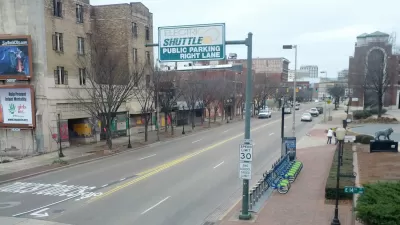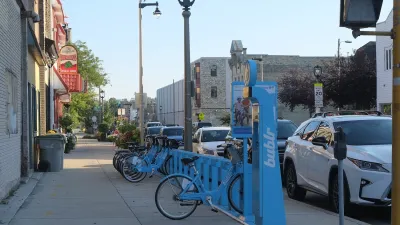Chattanooga didn't let its small population, sprawling environment, and weak cycling culture prevent the city from implementing a small-scale bike-share system. Their experience could hold lessons for other small cities that want jump in the saddle.

After studying the possibility of implementing a bike-share system beginning in 2007, Chattanooga, Tennessee (pop. 170,000) was able to cobble together enough funding and support to launch a 30 station, 300 bike system last July, beating larger cities like New York and Chicago in the process, writes Angie Schmitt. Chattanooga Bike Coordinator Philip Pugliese discussed the city's experiences last week at the New Partners for Smart Growth Conference in Kansas City.
“Our purpose with bike-sharing was to put a large amount of cyclists on the street in a short time, to change the dynamic, to improve our air quality, our health and active transportation overall,” he said.
"It can be difficult to launch bike-share in a small city with a transportation system that is heavily reliant on car travel, Pugliese said. But Chattanooga’s experience can offer inspiration to other small cities."
"In its first six months of operation, the system has provided 12,600 rides. Together, riders burned more than one million calories. All those bike trips have resulted in up to a 8,100-pound reduction in emissions. The system will add three more stations in residential neighborhoods in the spring," adds Schmitt.
"Securing enough capital to keep the system going through the lean start-up years is important, especially in smaller markets, where programs may find themselves on weaker financial footing than in larger cities, Pugliese said. He said the city considers the system an experimental pilot project."
FULL STORY: Chattanooga Bike-Share: Lessons for Smaller Cities

Alabama: Trump Terminates Settlements for Black Communities Harmed By Raw Sewage
Trump deemed the landmark civil rights agreement “illegal DEI and environmental justice policy.”

Planetizen Federal Action Tracker
A weekly monitor of how Trump’s orders and actions are impacting planners and planning in America.

Why Should We Subsidize Public Transportation?
Many public transit agencies face financial stress due to rising costs, declining fare revenue, and declining subsidies. Transit advocates must provide a strong business case for increasing public transit funding.

Understanding Road Diets
An explainer from Momentum highlights the advantages of reducing vehicle lanes in favor of more bike, transit, and pedestrian infrastructure.

New California Law Regulates Warehouse Pollution
A new law tightens building and emissions regulations for large distribution warehouses to mitigate air pollution and traffic in surrounding communities.

Phoenix Announces Opening Date for Light Rail Extension
The South Central extension will connect South Phoenix to downtown and other major hubs starting on June 7.
Urban Design for Planners 1: Software Tools
This six-course series explores essential urban design concepts using open source software and equips planners with the tools they need to participate fully in the urban design process.
Planning for Universal Design
Learn the tools for implementing Universal Design in planning regulations.
Caltrans
Smith Gee Studio
Institute for Housing and Urban Development Studies (IHS)
City of Grandview
Harvard GSD Executive Education
Toledo-Lucas County Plan Commissions
Salt Lake City
NYU Wagner Graduate School of Public Service



























